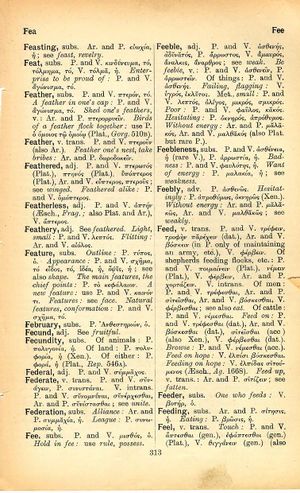feel: Difference between revisions
φιλοκαλοῦμέν τε γὰρ μετ' εὐτελείας καὶ φιλοσοφοῦμεν ἄνευ μαλακίας → our love of what is beautiful does not lead to extravagance; our love of the things of the mind does not makes us soft
(CSV4) |
m (Woodhouse1 replacement) |
||
| Line 1: | Line 1: | ||
{{Woodhouse1 | {{Woodhouse1 | ||
|Text=[[File:woodhouse_313.jpg|thumb|link={{filepath:woodhouse_313.jpg}}]] | |Text=[[File:woodhouse_313.jpg|thumb|link={{filepath:woodhouse_313.jpg}}]] | ||
===verb transitive=== | |||
[[touch]]: [[prose|P.]] and [[verse|V.]] [[ἅπτεσθαι]] (gen.), [[ἐφάπτεσθαι]] (gen.) ([[Plato]]), [[verse|V.]] [[θιγγάνειν]] (gen.) (also [[Xenophon|Xen.]]), [[ψαύειν]] (gen.) (rare [[prose|P.]]), [[ἐπιψαύειν]] (gen.); see [[touch]]. | |||
[[feel]] ([[sorrow]], [[anger]], [[joy]], etc.): [[prose|P.]] and [[verse|V.]] [[ἔχειν]]. | |||
[[feel gratitude]]: [[prose|P.]] and [[verse|V.]] [[χάριν εἰδέναι]], [[χάριν ἔχειν]]. | |||
[[be vexed at]]: [[Aristophanes|Ar.]] and [[prose|P.]] [[ἀγανακτεῖν]] (dat.), [[prose|P.]] [[χαλεπῶς φέρω]], [[χαλεπῶς φέρειν]] (acc.), [[prose|P.]] and [[verse|V.]] [[ἄχθεσθαι]] (dat.). | |||
[[appreciate]]: [[prose|P.]] [[περὶ πολλοῦ ποιεῖσθαι]], [[verse|V.]] [[πολλῶν ἀξιοῦν]]. | |||
[[feel one's way]]: [[Aristophanes|Ar.]] and [[prose|P.]] [[ψηλαφᾶν]]. | |||
[[feeling his way with a stick]]: [[verse|V.]] [[σκήπτρῳ προδεικνύς]] ([[Sophocles|Soph.]]. ''[[Oedipus Rex]]'' 456). | |||
===verb intransitive=== | |||
Met., | |||
[[be affected]]: [[prose|P.]] and [[verse|V.]] [[πάσχειν]]. | |||
[[how do you feel]]? [[prose|P.]] and [[verse|V.]] [[πῶς ἔχεις]]; | |||
[[feel well]] or [[ill]]: [[prose|P.]] and [[verse|V.]] [[εὖ ἔχειν]], [[κακῶς ἔχειν]]. | |||
[[perceive]]: [[prose|P.]] and [[verse|V.]] [[αἰσθάνεσθαι]], [[ἐπαισθάνεσθαι]]; see [[perceive]]. | |||
[[feel friendly towards]]: [[prose|P.]] [[εὐνοϊκῶς διακεῖσθαι πρός]] (acc.). | |||
[[I feel that I did wrong]]: use [[prose|P.]] and [[verse|V.]] [[σύνοιδα ἐμαυτῷ ἀδικῶν]] or [[ἀδικοῦντι]]. | |||
[[how most Macedonians feel towards Philip one could have no difficulty in discovering from this]]: [[prose|P.]] [[οἱ πολλοὶ Μακεδόνων πῶς ἔχουσι Φιλίππῳ ἐκ τούτων ἄν τις σκέψαιτο οὐ χαλεπῶς]]. | |||
[[just as fractures and sprains make themselves felt when the body catches any disease]]: [[prose|P.]] [[ὥσπερ τὰ ῥήγματα καὶ τὰ σπάσματα ὅταν τι κακὸν τὸ σῶμα λάβῃ τότε κινεῖται]] ([[Demosthenes|Dem.]] 294). | |||
[[feel oneself]] (injured, etc.): use [[consider]]. | |||
[[feel for]], [[grope for]]: [[prose|P.]] [[ἐπιψηλαφᾶν]] (gen.), [[Aristophanes|Ar.]] [[ψηλαφᾶν]] (acc.). | |||
Met., [[sympathise with]]: [[prose|P.]] and [[verse|V.]] [[συναλγεῖν]] (dat.); see [[sympathise]]. | |||
}} | }} | ||
Revision as of 08:49, 20 May 2020
English > Greek (Woodhouse)
verb transitive
touch: P. and V. ἅπτεσθαι (gen.), ἐφάπτεσθαι (gen.) (Plato), V. θιγγάνειν (gen.) (also Xen.), ψαύειν (gen.) (rare P.), ἐπιψαύειν (gen.); see touch.
feel (sorrow, anger, joy, etc.): P. and V. ἔχειν.
feel gratitude: P. and V. χάριν εἰδέναι, χάριν ἔχειν.
be vexed at: Ar. and P. ἀγανακτεῖν (dat.), P. χαλεπῶς φέρω, χαλεπῶς φέρειν (acc.), P. and V. ἄχθεσθαι (dat.).
appreciate: P. περὶ πολλοῦ ποιεῖσθαι, V. πολλῶν ἀξιοῦν.
feel one's way: Ar. and P. ψηλαφᾶν.
feeling his way with a stick: V. σκήπτρῳ προδεικνύς (Soph.. Oedipus Rex 456).
verb intransitive
be affected: P. and V. πάσχειν.
how do you feel? P. and V. πῶς ἔχεις;
feel well or ill: P. and V. εὖ ἔχειν, κακῶς ἔχειν.
perceive: P. and V. αἰσθάνεσθαι, ἐπαισθάνεσθαι; see perceive.
feel friendly towards: P. εὐνοϊκῶς διακεῖσθαι πρός (acc.).
I feel that I did wrong: use P. and V. σύνοιδα ἐμαυτῷ ἀδικῶν or ἀδικοῦντι.
how most Macedonians feel towards Philip one could have no difficulty in discovering from this: P. οἱ πολλοὶ Μακεδόνων πῶς ἔχουσι Φιλίππῳ ἐκ τούτων ἄν τις σκέψαιτο οὐ χαλεπῶς.
just as fractures and sprains make themselves felt when the body catches any disease: P. ὥσπερ τὰ ῥήγματα καὶ τὰ σπάσματα ὅταν τι κακὸν τὸ σῶμα λάβῃ τότε κινεῖται (Dem. 294).
feel oneself (injured, etc.): use consider.
feel for, grope for: P. ἐπιψηλαφᾶν (gen.), Ar. ψηλαφᾶν (acc.).
Met., sympathise with: P. and V. συναλγεῖν (dat.); see sympathise.

